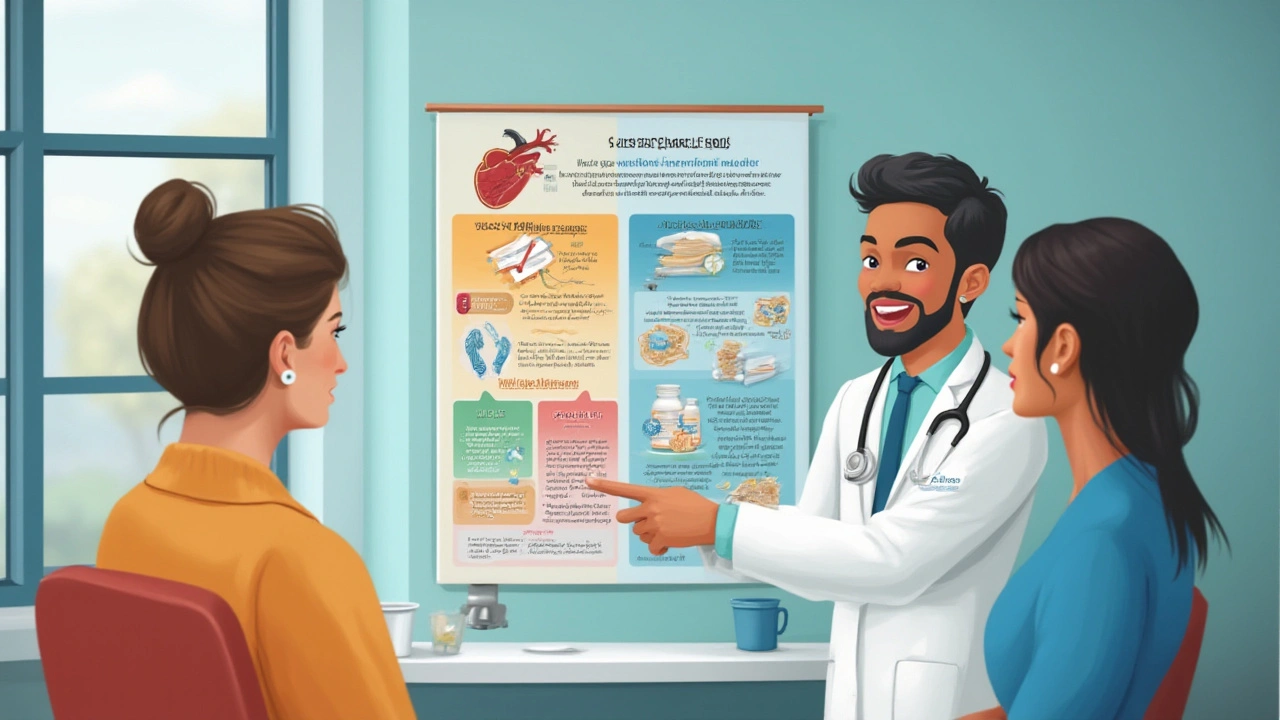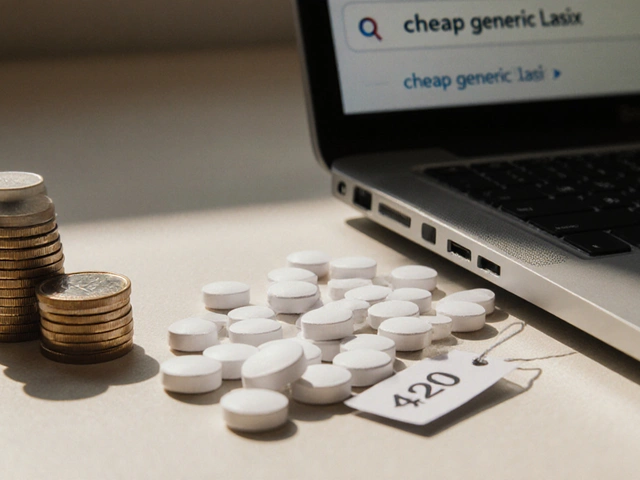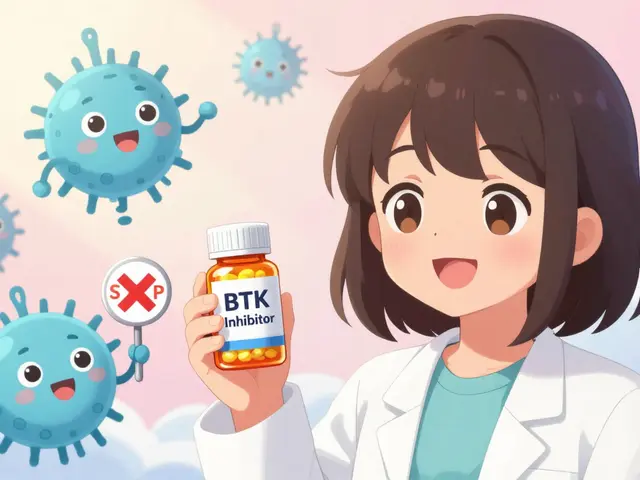Ever had that moment where you’re standing in a pharmacy aisle, staring at rows of supplement bottles, wondering if any of these could actually help your heart? You’re definitely not the only one. When it comes to heart health—especially for anyone who’s recently taken a break from metoprolol or is exploring alternatives—the world of natural supplements can get confusing fast. The buzz around magnesium, CoQ10, and omega-3s is everywhere. But do they live up to the hype, or are they just hope in a bottle? Grab a cup of tea, because it’s time to get real about the science, the stats, and what your heart really needs after metoprolol.
Understanding Life After Metoprolol: What Changes for the Heart?
Metoprolol’s been a go-to for managing high blood pressure and chest pain, controlling heart rates, and even protecting people after a heart attack. But maybe your doctor said you could reduce your dose, or you’re checking out metoprolol substitute options. Whether that’s for side effect relief, cost reasons, or just a change in your health status, coming off metoprolol can make your heart feel like it’s suddenly on its own. What actually happens when you drop metoprolol? Your body’s sympathetic nervous system—the part that revs up your heart—is less controlled. Blood pressure can rise a little. Some folks notice their heartbeats speed up or feel more "thumpy." Blood vessels may tense more easily, and old palpitations sometimes return. This is why many cardiologists remind patients not to just quit cold turkey. So, what’s next? Suddenly, the question isn’t just "What should I take instead?" It’s "What can I add to the daily routine that might help defend my cardiovascular health?" Cue the explosion of interest in supplements. But keep in mind—not all “cardio-friendly” supplements do the same things as prescription meds like metoprolol. Your heart deserves more than flashy labels. Let’s drill down into the evidence around magnesium, CoQ10, and omega-3s, with a focus on real benefits (and real limits) for life after beta blockers.
Magnesium: The Heart’s Underrated Ally
This one’s a classic, yet so many of us don’t get quite enough. Magnesium is a mineral with a starring role in over 300 processes inside your body—seriously, it’s the multitasker in chief. For your heart, magnesium helps relax blood vessels, keeps rhythms regular, and keeps both blood pressure and stress hormones in check. When metoprolol steps out of the picture, keeping things calm and regular around your heart suddenly feels more important than ever. The science is surprisingly solid. In the HYVET study (Hypertension in the Very Elderly Trial), older adults who kept their magnesium levels at the higher end of the normal range had meaningfully lower blood pressure. The magic number seems to hover between 350 and 420mg daily for adults, according to the National Institutes of Health. A meta-analysis in the "Journal of Clinical Hypertension" found that magnesium supplementation led to average reductions in systolic blood pressure of 2.00 mmHg and diastolic by 1.78 mmHg—modest, but not nothing. But there’s more: magnesium is critical for heart rhythm stability. In hospitals, IV magnesium is actually a frontline fix for life-threatening arrhythmias. Low magnesium can make the heart’s electrical system more irritable—which is exactly the last thing you want if you’re no longer getting a rate-slowing beta blocker! Here’s where it gets interesting—some meds, like diuretics or proton pump inhibitors, can quietly drain your magnesium reserves, and people with diabetes (or even those who sweat a lot during workouts) tend to run low. If you’ve ever had leg cramps, twitchy muscles, or a fluttery heart, low magnesium might be creeping around. So, what’s the right way to get more magnesium? Don’t just grab the first magnesium oxide bottle you see. Magnesium glycinate or citrate are best for absorption and the least likely to upset your stomach. And of course, leafy greens, pumpkin seeds, whole grains, and almonds are natural magnesium boosters. Still, there’s no need to overdo it—too much magnesium (say, from big supplement doses) can cause diarrhea, so stick to recommended amounts unless your doc gives the green light for more.

CoQ10: Power-Up for Your Heart’s Engines
Move over, energy drinks. CoQ10 is what your heart cells really want when it comes to stamina and spark. This vitamin-like compound helps the mitochondria in every cell (especially hardworking ones like heart muscle cells) produce energy efficiently. Some folks call it the heart’s “spark plug.” Here’s why CoQ10 lands high on supplement lists after coming off beta blockers like metoprolol: Certain blood pressure drugs, including beta blockers and statins, can actually deplete the body’s natural CoQ10 stores. And as we age, our levels naturally slide lower—just when we need them most for a strong heart. Clinical trials show promise. In a major 2018 review published in “Clinical Nutrition,” CoQ10 supplements were linked to better heart function and fewer symptoms in people with chronic heart failure. Doses in studies usually sit between 100–300mg daily (higher doses might help with heart failure or after heart attacks, but always check with a cardiologist first). What about blood pressure? A meta-analysis out of Australia found that CoQ10 lowered systolic blood pressure by about 11 mmHg in people with hypertension. That’s actually comparable to some prescription pills! But don’t toss your meds just yet—most experts see CoQ10 as a helper, not a full replacement. Any side effects? CoQ10 is generally well-tolerated—even at higher doses. A few people report mild insomnia or an upset stomach, but it’s usually a smooth ride—especially if you pair your dose with food. One tip: Look for the “ubiquinol” form (it’s more bioavailable than ubiquinone, which your body must convert). And go for brands that test their products for purity—CoQ10 supplements can vary a lot in potency.
Omega-3s: From Salmon to Capsules, How They Really Help Your Heart
You’ve heard it a hundred times—eat your salmon, grab some walnuts, maybe take fish oil capsules. But where’s the real benefit for your heart, especially if metoprolol’s not in the picture any more? Omega-3 fatty acids (like EPA and DHA) are known for taming inflammation and smoothing out those electrical misfires that can make the heart skip or race. That’s a big deal when your oldest heart health protector (i.e., metoprolol) has just retired. The landmark GISSI-Prevenzione study in Italy put omega-3s on the map: daily fish oil supplements reduced sudden cardiac death by 45% in people who’d already had a heart attack—pretty impressive. But wait—does that mean grabbing any $5 bottle at the drugstore is a magic fix? Not quite. The evidence is strongest for people who start with lower omega-3 levels or have had heart problems before. Fish and seafood deliver the best forms naturally, and the American Heart Association now recommends eat fish (like salmon, sardines, or mackerel) twice a week for most adults. For supplements, a 2023 study in "JAMA Cardiology" found that doses around 1,000mg of EPA/DHA daily lowered triglycerides and helped support heart rhythm. Higher doses (up to 4g) worked even better—but those mega-doses are usually only for folks with sky-high triglycerides, and you should absolutely talk to your doctor first. Here’s the catch: Not all omega-3 supplements are created equal. Some lower-end fish oil capsules have less EPA/DHA than advertised or can oxidize (go rancid) before you even open the bottle. Smell them—if they stink like rotten fish, toss them out! Better sources are refrigerated brands with clear dosing on the label. Some people worry about mercury from fish-based supplements. The good news is most reputable brands filter out toxins, and plant-based omega-3s (like algae oil) are also a good pick for vegetarians or those with concerns about seafood sustainability.

Smart Supplement Strategies, Common Pitfalls, and Real-World Tips
Supplements can be confusing, and it’s easy to get swept up in the hype. Here’s a quick cheat sheet for making the most of magnesium, CoQ10, and omega-3s for *heart health* after metoprolol:
- Test, don’t guess. Ask your doctor for basic bloodwork before adding anything big to your routine—especially if you have kidney issues, are on blood-thinners, or take medications that mess with electrolytes.
- Start low, go slow. Everyone’s different when it comes to absorption, tolerance, and the right "sweet spot." Track how you feel (energy, sleep, heart rate) to see what works for you.
- Check for interactions. Even natural supplements can boost or block certain medications. Be especially mindful with anticoagulants, blood pressure meds, and diabetes drugs.
- Don’t overload your body. More doesn't always mean better—stick to science-backed doses, unless your doctor’s monitoring you closely.
- Pair supplements with real whole foods. The Mediterranean diet, packed with leafy greens, nuts, wild fish, and olive oil, is already loaded with these nutrients and does wonders for the heart (and your taste buds).
Got a geeky side? Here’s a values-packed table of what current evidence says about these supplements and typical doses used in research:
| Supplement | Primary Benefit | Typical Dose | Known Risks | Best Food Source |
|---|---|---|---|---|
| Magnesium | Blood pressure control, anti-arrhythmic | 350-420mg/day | Diarrhea at high doses | Pumpkin seeds, spinach |
| CoQ10 | Improves heart energy, lowers blood pressure | 100-300mg/day | Rare stomach upset | Grass-fed beef, oily fish |
| Omega-3 (EPA/DHA) | Lower triglycerides, anti-inflammatory, anti-arrhythmic | 1,000-4,000mg/day | Possible bleeding at high doses | Salmon, sardines |
If you’re still feeling lost in supplement land or just want a personal roadmap for your heart’s next chapter, bring your questions (and maybe this article) to your next checkup. Quality supplements can support heart health, but they’re not a magic shield. Real heart strength comes from good food, restful sleep, stress-busting routines, moving your body every day, and—in certain situations—modern medicine’s help.






Ophelia Q
July 23, 2025OMG YES. I came off metoprolol last year and my heart felt like it was doing the cha-cha. Started magnesium glycinate and CoQ10 and honestly? Life changed. No more midnight palpitations. 🙌